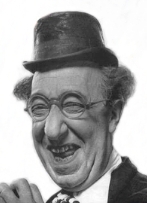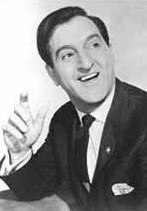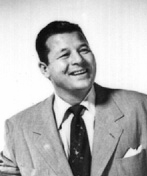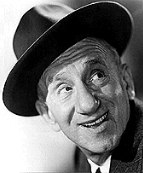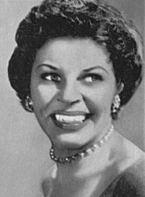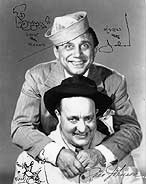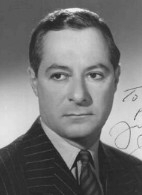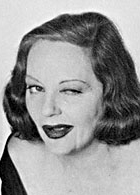| The
Hosts |
| |
Ed
Wynn
Season
1 - 11 Episodes
Season 2 - 7 Episodes
Known
as "The Perfect Fool," Ed Wynn was a veteran of vaudeville and radio,
and at the premiere of Four Star Revue, had already had a year's experience
in television, hosting his own show. |
| |
Danny
Thomas
Season 1 - 12
Episodes
Season 2 - 8 Episodes
Following success as a nightclub entertainer, Danny Thomas was considered a natural
for television. While his Four Star/All Star Revue stint was entertaining,
it wasn't until his Make Room for Daddy sitcom that Thomas became a bonafide
TV star. |
|
|
Jack
Carson
Season 1 - 10 Episode
Season 2 - 4 Episodes
A
versatile character actor, equally comfortable in both comedy and drama, Jack
Carson was a familiar face to moviegoers. He made a series of films co-starring
Dennis Morgan and was popular on radio before moving into television. |
| |
Jimmy Durante
Season 1 - 8 Episodes
Season 2 - 8 Episodes
Season 3 - 8 Episodes
One
of America's most beloved
entertainers, Jimmy Durante starred in more episodes of Four Star/All Star
Revue than any other host. His act was similar to that seen on his other radio
and TV shows, including the trademark, "Good night, Mrs. Calabash, wherever
you are." |
|
|
Martha Raye
Season 2 - 4 Episodes
Season 3 - 5 Episodes
Season
4 - 3 Episodes
One
of the great comediennes of 1950s television, Martha Raye was the only host to
survive the third season of All Star Revue, which morphed into her own
show that continued on for more than two seasons. |
| |
Olsen
and Johnson
Season 2 - 4 Episodes
Longtime
veterans of films, Olsen and Johnson didn't quite gel on television. Their run
on All Star Revue was a short one. |
| |
George
Jessel
Season 3 - 6 Episodes
The
ultimate toastmaster, Jessel was a natural at witty repartee and knew how to bring
out the best in his guests. |
| |
Tallulah
Bankhead
Season 3 - 6 Episodes
The
grand dame of the cutting remark, Tallulah Bankhead shone on TV, as she had on
radio and in the theater. Sadly, her tenure as a small screen hostess was a brief
one. | |
Broadcast
History
Wednesdays, 8:00 - 9:00 pm, NBC-TV
Four
Star Revue (10/4/1950 - 7/18/1951)
Saturdays, 8:00 - 9:00 pm, NBC-TV
All Star Revue (9/18/1951 - 6/21/1952)
Saturdays,
8:00 - 9:00 pm, NBC-TV
All Star Summer Revue (6/28/1952 - 8/30/1952)
Saturdays,
8:00 - 9:00 pm, NBC-TV
All Star Revue (9/6/1952 - 4/18/1953)
Saturdays, 9:00 - 10:30 pm (every
4th week), NBC-TV
All Star
Revue (10/3/1953 - 12/26/1953)
If
Four Star Revue was the sister show to The
Colgate Comedy Hour, it was the poorer of the two siblings. Both were
on the same network and had the same variety format, with rotating hosts who often
crossed over from one show to the other. But what Four Star Revue didn't
share with The Comedy Hour was great ratings. Not
that the ratings were bad. In fact, they were quite respectable. In its second
season, the show tied with Dragnet for 20th place. And even in it's third
and final season as a weekly show, it had only fallen to 26th place - just behind
Amos 'n' Andy.
The real problem was cost. At the time of its premiere, Revue cost $50,000
an episode to produce, making it one of the two most expensive shows on television
(the other being The Colgate Comedy Hour). Naturally, at that price, its
sponsors wanted to see a reasonable return on their investment. But when they
saw other shows scoring higher ratings at a fraction of the cost, they began to
wonder if they couldn't get a bigger bang for their buck elsewhere. So
not surprisingly, holding on to sponsors was a problem. In contrast to The
Comedy Hour, which had the same sponsor for its entire run, Revue saw
its underwriters come and go. Because the cost was so high, NBC came up with an
arrangement to split it equally between three sponsors. But even then, the sponsors
kept bailing. Another issue
Revue had to deal with was the revue format itself. It became apparent
early on that simply plugging in a big star didn't guarantee success. The format
worked well for old vaudevillians like Jimmy Durante and (for a time) Ed Wynn
or a visual comedienne like Martha Raye. But for personalities like George Jessel
and Tallulah Bankhead, whose humor was more verbal and cerebral, it was less successful.
And supper club entertainer Danny Thomas didn't find his perfect TV vehicle until
landing the lead on the sitcom Make Room For Daddy. As
is evident in the smattering of episodes that still exist, Four Star Revue/All
Star Revue has much to recommend it as entertainment, not to mention its historical
importance for the place it holds in the careers of many great entertainers. An
example of the big budget, megastar variety show of the early fifties, it was
eventually done in by the economics of the television business.
| Behind
the Scenes Like
the Colgate Comedy Hour, Four Star Revue/All Star Revue had a dependable
array of talented people running things in the background. NBC's
Pete Barnum was the first executive producer, joined by Harold Kemp of the William
Morris Agency in the second season. Sam Fuller of NBC took over that job in the
third season. These people had, as their primary responsibility, the role of liaison
between their companies and the show. Barnum and Fuller also ensured that the
hosts were well stocked with big name guest stars. Various producers worked under
the execs, doing the day-to-day job of getting the show on the air. Joseph
Santley, remembered today primarily for staging the musical numbers in the Marx
Brothers' debut film The Cocoanuts, was Jimmy Durante's producer-director,
not just on Revue but on the Schnoz's subsequent Colgate Comedy Hour
and Texaco Star Theater stints, as well. Santley had directed Durante in
the 1940 Gene Autry vehicle Melody Ranch and did some producing-directing
for Ed Wynn on Revue, too. Leo
Morgan, who later worked on Sid Caesar's Caesar's Hour, produced for Danny
Thomas, Olsen and Johnson, and Martha Raye. Norman Zeno was Jack Carson's first
producer, before Coby Ruskin was promoted from director to replace him. (Ruskin
was subsequently blacklisted for a time and had to move to England to find work.
Returning to the States, he resumed his career by directing shows like The
Andy Griffith Show, Gomer Pyle, U.S.M.C., and Here's Lucy.) Tallulah
Bankhead brought her producer-director Dee Engelbach over from her radio program
The Big Show, while George Jessel borrowed Martin and Lewis's Colgate
Comedy Hour producer-director Ernest D. Glucksman. Ezra
Stone, who had played eternal teenager Henry Aldrich on radio ("Coming, Mother!"),
directed Revue episodes for Danny Thomas, Ed Wynn, Martha Raye, and Ezio
Pinza. He was married to actress Sara Seegar, and his subsequent work included
episodes of The Munsters and Lost in Space. Other
directors were James V. Kern (later of I Love Lucy and My Three Sons),
Garry Simpson, Bill Bacher, and Tim Whelan. In
the early days of TV, there were often two directors, one to stage the show and
another to handle the technical task of directing the cameras. On Revue,
TV directors included Grey Lockwood, Sid Smith, Doug Rodgers, and Hal Keith. 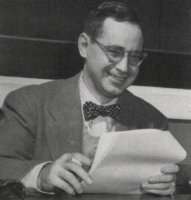 |
| Writer-director
Nat Hiken worked for Jack Carson and Martha Raye on Four Star Revue/All Star
Revue. |
The
brilliant Nat Hiken, who had been with Fred Allen and Milton Berle on radio, was
Jack Carson's head writer before performing the same function on Martha Raye's
shows. At the start of the third season, he became Raye's director, as well, before
moving on to create the classic Phil Silvers Show (aka Sgt. Bilko)
and Car 54, Where Are You? Working with Hiken on scripts were Billy Friedberg
and Al Singer. Throughout
his 1950s TV shows, Jimmy Durante primarily used only two writers, Charles Isaacs
and Jack Elinson, while Ed Wynn's
list was much longer and included John Whedon, Seaman Jacobs, Bud Pearson, Dick
McKnight, Bob Schiller, Vincent Bogert, Al Johansen, Leo Solomon, Bud Pearson,
Joe Stein, Stan Burns, Herb Sargent, Maurice Richlin, Bill Jacobson, Art Stander,
Sid Dorfman, and Hal Kanter. Danny
Thomas wrote some of his own material, but also relied on Arnold Horwitt, Morris
Freedman, Julie Oshins, Bob Schiller, Phil Sharp, Aaron Ruben, and Jerry Seelen. George
Jessel's writers were Mannie Manheim and Larry Gelbart (formerly of Your Show
of Shows and Bob Hope and futurely of M*A*S*H). Tallulah Bankhead performed
material written by Mort Green, George Foster, Robert Tallman, Howard Snyder &
Hugh Wedlock, and Danny Simon & his brother Doc Simon (who would grow up to become
superstar playwright Neil Simon). Some
of the show's choreographers were future Hollywood director Herbert Ross (for
Martha Raye), George Hale and Aida Broadbent (Jimmy Durante), Ronnie Fletcher
(Tallulah Bankhead), Valerie Bettis (Ezio Pinza), and Seymour Felix (The Ritz
Brothers). Musical
directors included Merle Kendrick (Ed Wynn), Lou Bring (Danny Thomas and Ed Wynn),
Roy Bargy (Jimmy Durante), Dean Elliott (Jack Carson), George Bassman (Martha
Raye), Milton DeLugg (Olsen and Johnson), Meredith Willson (Tallulah Bankhead),
and Al Goodman (George Jessel). Andre
Baruch was announcer in the early, New York-based episodes, while Don Pardo filled
that role in later episodes originating from that city. Hal Sawyer introduced
many west coast episodes. | Sources As
usual, I've tried to stick to primary sources as much as possible. The main ones
are The New York Times TV listings, ads, articles, and reviews, Variety
reviews and articles, Time magazine reviews and TV listings, the online
catalog of the UCLA television archives,
the Internet Broadway Database, and
the episodes themselves. I've also made use of the books Inka Dinka Doo: The
Life of Jimmy Durante by Jhan Robbins (Paragon House, 1991), Make Room
For Danny by Danny Thomas with Bill Davidson (G. P. Putnam's Sons, 1991),
Ed Wynn's Son By Keenan Wynn as told to James Brough (Doubleday & Company,
1959), Take It From the Big Mouth: The Life of Martha Raye by Jean Maddern
Pitrone (The University Press of Kentucky, 1999) and King of the Half Hour:
Nat Hiken and the Golden Age of TV Comedy by David Everitt (Syracuse University
Press, 2001). |
|

